2018-Apr-23
Water Quality
Water quality issues fall into three categories:
- Water purity
- Recreational water quality
- Water Ecosystem
Water quality issues fall into three categories:

Lake Michigan-Huron is 8 inches below its level at this time last year. From a month ago, the water levels on Lakes Superior, Michigan-Huron, St. Clair, Erie & Ontario are up 6, 4, 4, 4 & 7 inches, respectively. Lakes Superior, Michigan-Huron, St. Clair & Erie are lower by 2, 8, 7, & 6 inches, respectively, than they were at this time last year. Lake Ontario is up 1 inch. Lakes Superior, Michigan-Huron & Ontario are 4, 6 & 2 inches below their long-term May averages. Lakes St. Clair and Erie are 3 & 5 inches above their long-term May averages, respectively. All the lakes remain well below their May record highs. In a month, Lakes Superior, Michigan-Huron, St. Clair & Ontario are expected to rise by 4, 2, 1 & 3 inches, respectively. Lake Erie levels
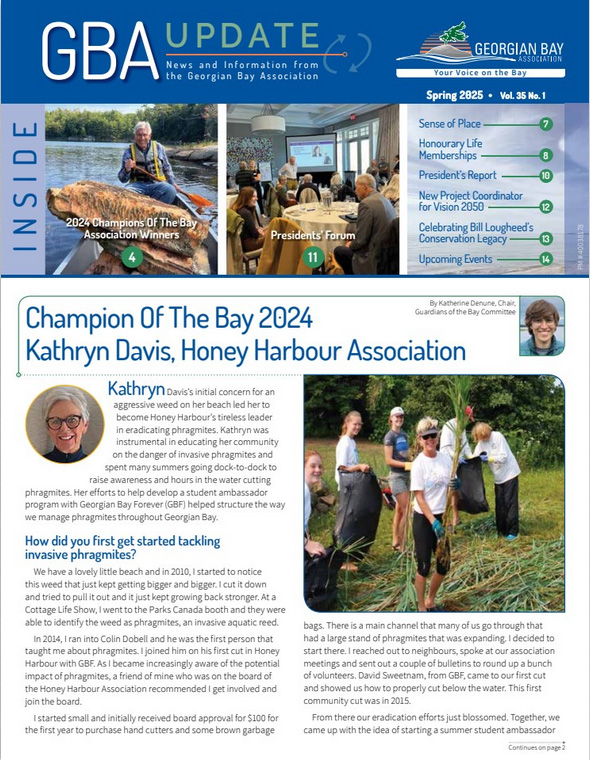

A recent Cottage Life Mar/Apr '25 article, "If cormorants aren’t actually bad for the ecosystem, can we bear to let them exist?", highlights the complexities of human-wildlife conflict and asks readers to rethink our wildlife acceptance capacity. GBA President, Liz Phillips, was interviewed for the piece and emphasized the "need to learn to live with the natural behavior of wildlife that can survive in our human-dominated environment." Double-crested cormorants, once vilified as an invasive species, are actually native to Ontario. Their population decline in the 1960s and '70s was due to toxic chemicals like DDT, but they've made a remarkable recovery. Despite scientific evidence showing they don't significantly impact native fish populations, a government-sanction
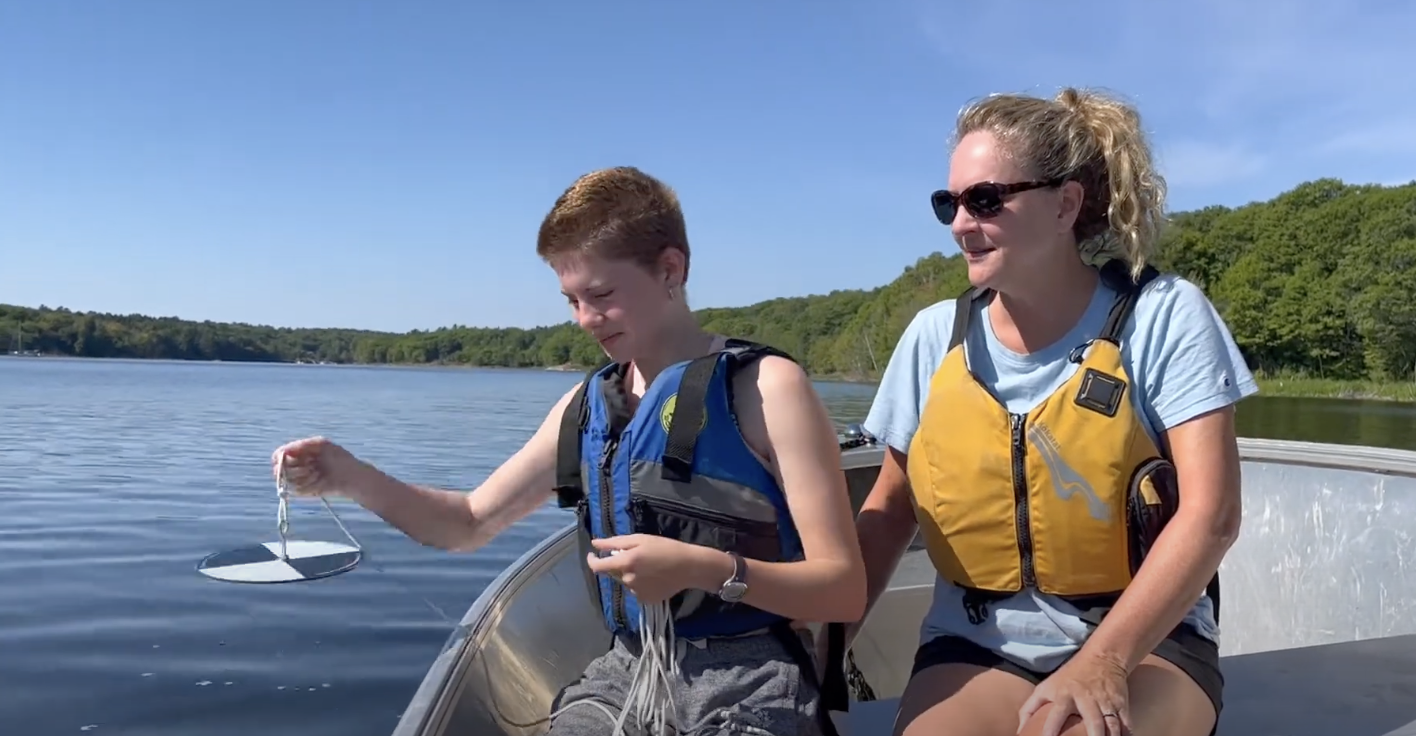
The Lake Partner Program (LPP), a vital water quality monitoring initiative, is at risk due to the impending end of its 5-year agreement with the Ministry of Environment, Conservation and Parks (MECP). Despite its immense value to the public and Ontario, a new agreement has not been confirmed, putting the program's future in jeopardy. The LPP is a volunteer-based water quality monitoring program that helps track the health of Ontario's lakes. The program relies on the dedication of 629 volunteer Lake Stewards who monitored 546 lakes at 917 sites across the province in 2024. However, the program needs Ministry-backed lab testing and coordination support to function. With nearly three decades of effort invested, the program's collapse would leave lake associations

GBA is seriously concerned about the effect of Bill 5, Protect Ontario by Unleashing our Economy Act, 2025, a sweeping omnibus bill aimed at opening mining opportunities in Ontario's Ring of Fire. This bill will make massive changes to the requirements for protecting endangered species and archaeological sites in the province. Bill 5 empowers the Ontario government to designate “special economic zones” which are exempted from provincial laws and municipal by-laws to expedite development. - What's at stake? If passed, this legislation will: - Repeal the provincial Endangered Species Act and replace it with the much weaker Species Conservation Act, 2025 Allow development to begin immediately after online registration rather than

Lake Michigan-Huron is 8 inches below its level at this time last year. From a month ago, the water levels on Lakes Superior, Michigan-Huron, St. Clair, Erie & Ontario are up 7, 4, 2, 4 & 7 inches, respectively. Lakes Superior, Michigan-Huron, St. Clair, Erie & Ontario are lower by 2, 8, 6, 6 & 1 inches, respectively, than they were at this time last year. Lakes Superior, Michigan-Huron & Ontario are 4, 6 & 4 inches below their long-term May averages. Lakes St. Clair and Erie are 4 & 5 inches above their long-term May averages, respectively. All the lakes remain well below their May record highs. In a month, Lakes Superior & Michigan-Huron are expected to rise by 4 & 3 inches, respectively. Lakes St. Clair and Ontario are expected to fall by 1 i

Premier Ford recently dismissed environmental permitting as “red tape,” which would be troubling on its own. But it’s not just rhetoric. Internal draft documents obtained by CBC News reveal plans to eliminate or radically overhaul all provincial and municipal permitting processes by the end of 2025. This isn’t an isolated move. It’s part of a larger pattern, and it threatens to unravel decades of environmental safeguards. If it proceeds, critical natural areas could be left open to unsustainable development. Permitting isn’t a barrier to growth; it’s the foundation of ecological, economic, and community resilience. It’s essential infrastructure for smart, sustainable development. The government should balance it
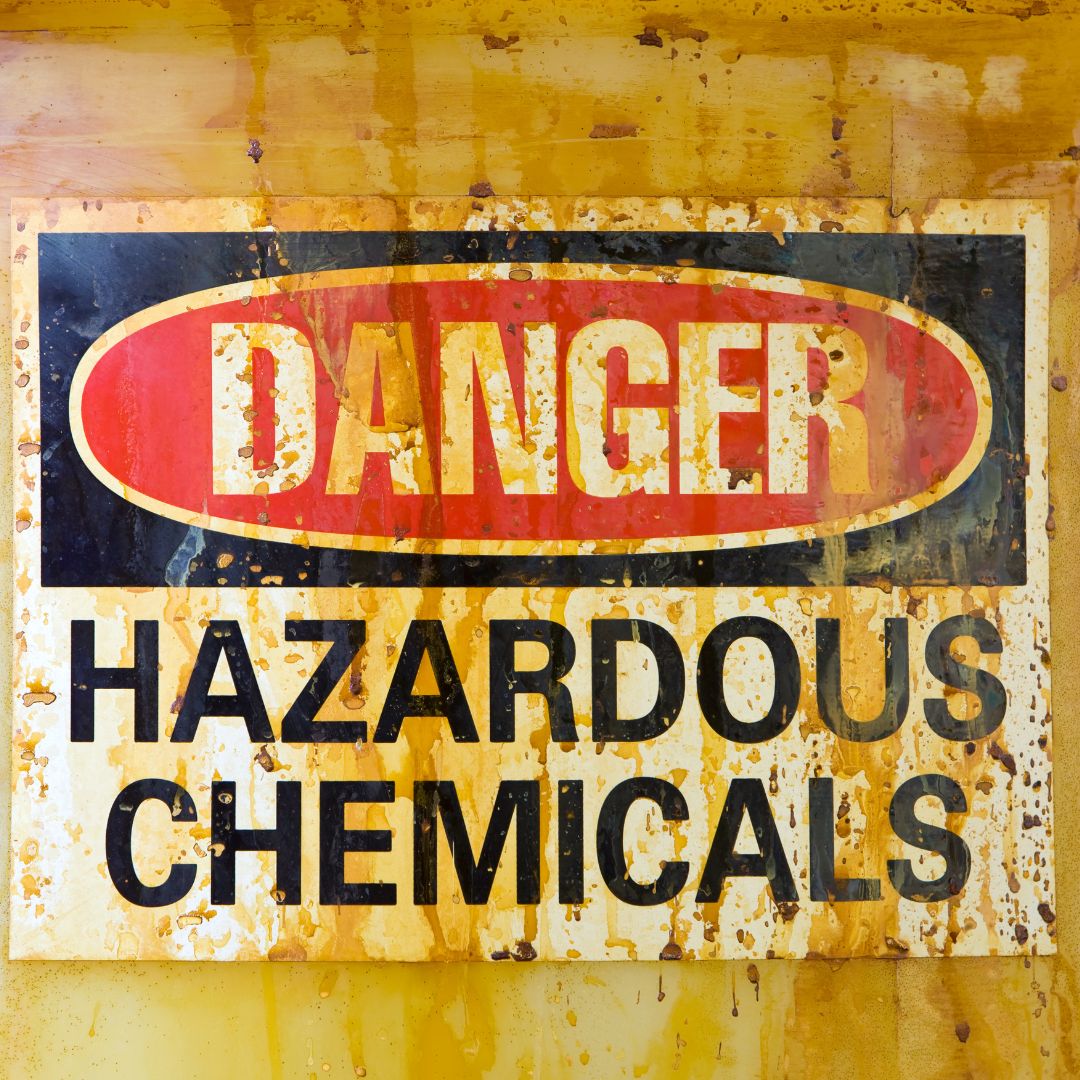
In a significant move to address environmental and health concerns, the Canadian government has designated most perfluoroalkyl and polyfluoroalkyl substances (PFAS) as toxic under the Canadian Environmental Protection Act (CEPA). This classification gives the government the authority to regulate and potentially ban the use of these “forever chemicals” in various products. PFAS, or “forever chemicals”, are a class of approximately 15,000 synthetic chemicals used to make products that resist water, oil, grease and heat, including makeup, stain-proof furniture, outdoor gear, and firefighting foam. These compounds do not break down in the environment and have been linked to various health issues, including kidney and liver damage, thyroid dise
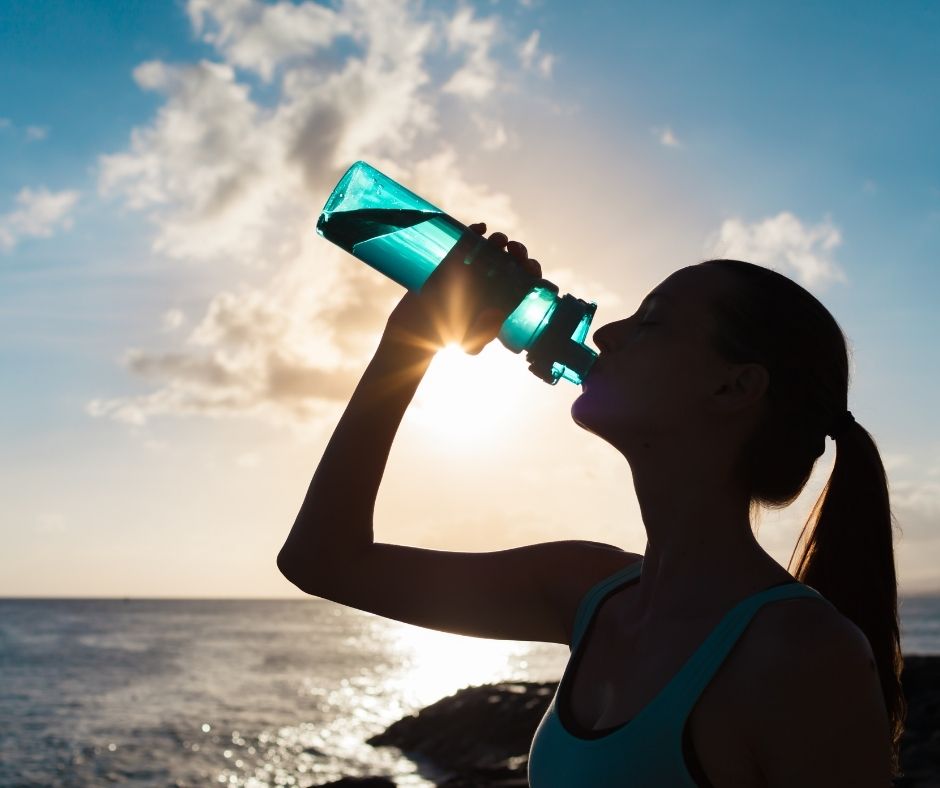
GBA has joined CELA and over two dozen organizations in signing a letter urging the Ontario Government to take action to protect drinking water in the province. The letter responds to the recent Auditor General's report highlighting significant weaknesses in the provincial government's ability to protect the health of Ontarians who rely on non-municipal drinking water systems. The report revealed alarming gaps in drinking water protection, including inadequate inspection frequency, non-compliance with testing requirements, and lack of supports for private well owners. The letter calls on the Ontario government to publicly develop and commit to an action plan by the end of 2025, outlining specific timelines and processes for implementing the Auditor General's 17
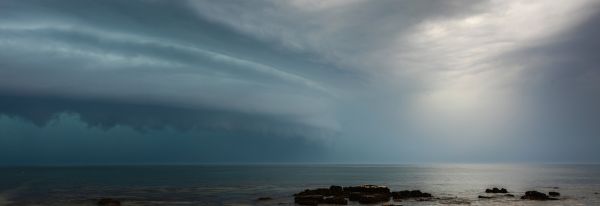
Emergency Preparedness Week runs from May 4 to 10, 2025, and it's a crucial reminder that emergencies can strike anywhere, anytime. This year's theme "Plan for every season", highlights the importance of preparing for emergencies throughout the year, not just during extreme weather events. From infectious diseases to extreme weather events like flooding and forest fires, being prepared is key to keeping you and your loved ones safe. Three simple steps to become better prepared to face a range of emergencies Know the risks - understand potential emergencies that could affect your area Make a plan - develop a household emergency plan that includes contact information, escape routes, and a meeting point Have an emergency kit - stock up on essentials like food, wa

Lake Michigan-Huron remains 7 inches below its level at this time last year. From a month ago, the water levels on Lakes Superior, Michigan-Huron, St. Clair, Erie & Ontario are up 6, 4, 4, 5 & 6 inches, respectively. Lakes Superior, Michigan-Huron, St. Clair, Erie & Ontario are lower by 3, 7, 9, 9 & 4 inches, respectively, than they were at this time last year. Lakes Superior, Michigan-Huron & Ontario are 6, 7 & 7 inches below their long-term May averages. Lakes St. Clair and Erie are 0 & 2 inches above their long-term May averages, respectively. All the lakes remain well below their May record highs. In a month, Lakes Superior, Michigan-Huron, St. Clair, Erie & Ontario are expected to rise by 4, 3, 2, 1 & 5 inches, respectively. &nbs
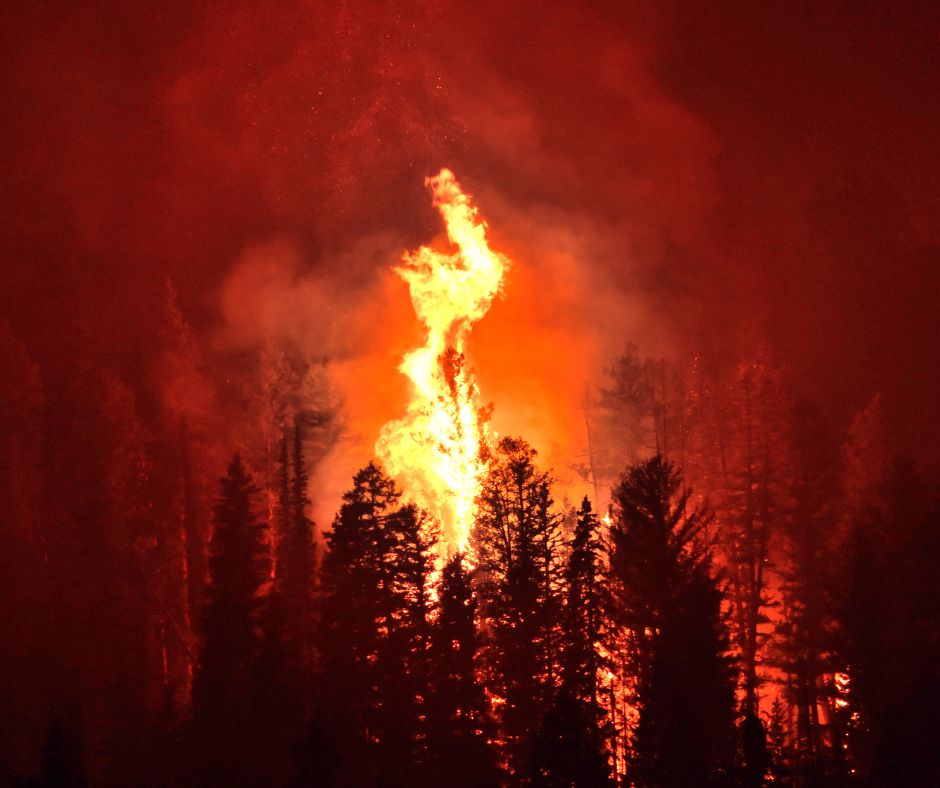
2024 Ontario Wildfire Statistics: We were fortunate. In 2024, the wildfire season started lowly with a wet spring and summer. Ontario saw a total of 480 wildland fires affecting 89,841 hectares across the province, which was well below the previous year and the ten-year average. In comparison, 2023 saw 741 wildland fires that affected 441,474 hectares across the province. The ten-year average is 694 wildland fires and 201,781 hectares affected. Regional breakdown: Statistical differences between the Northeast Region and Northwest Region in 2024: Total number of wildland fires by region Northwest Region - 218 fires, Northeast Region - 261 fires Total hectares burned by region Northwest Region – 69,938 hectares Northeast Region – 19
